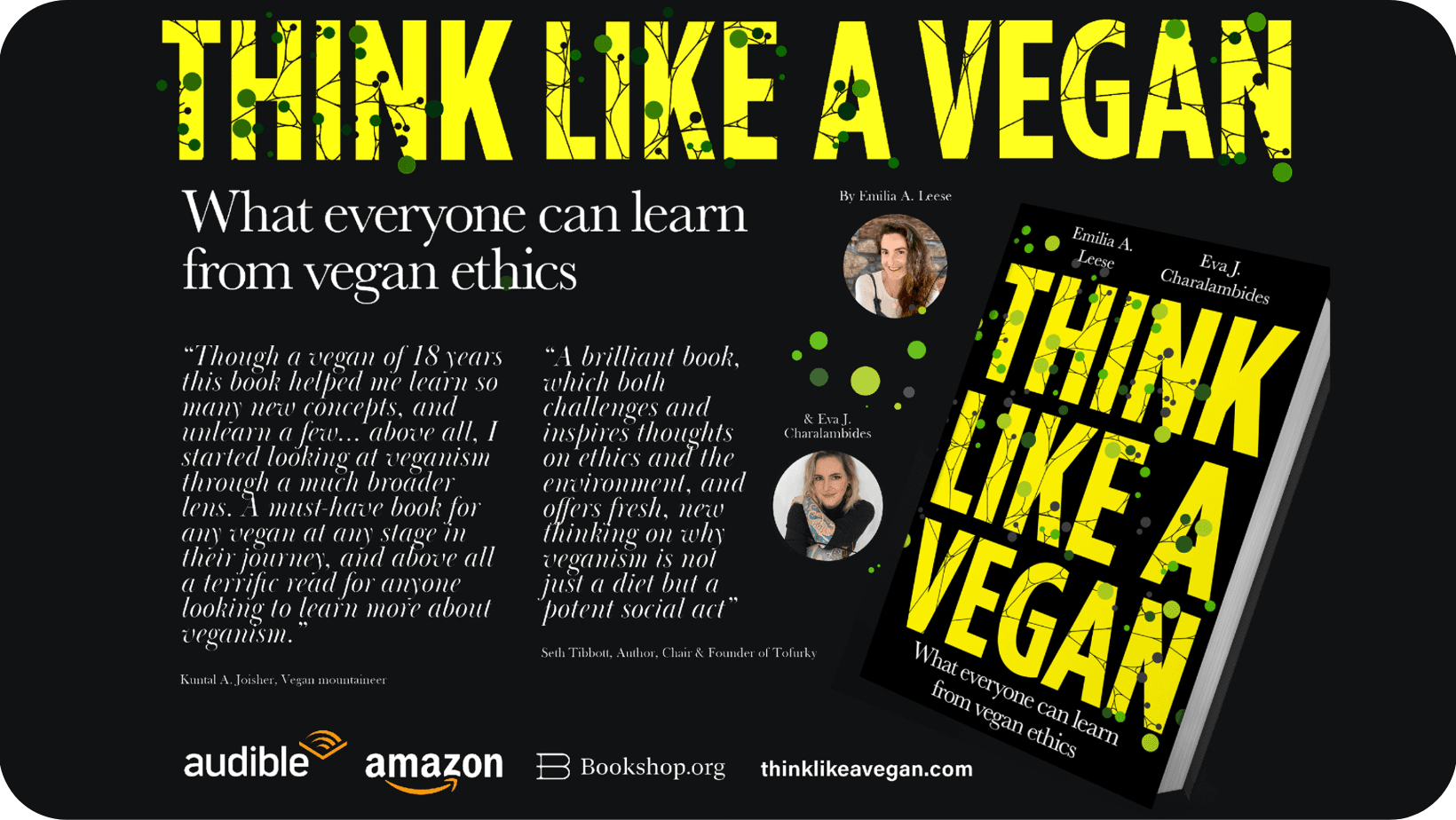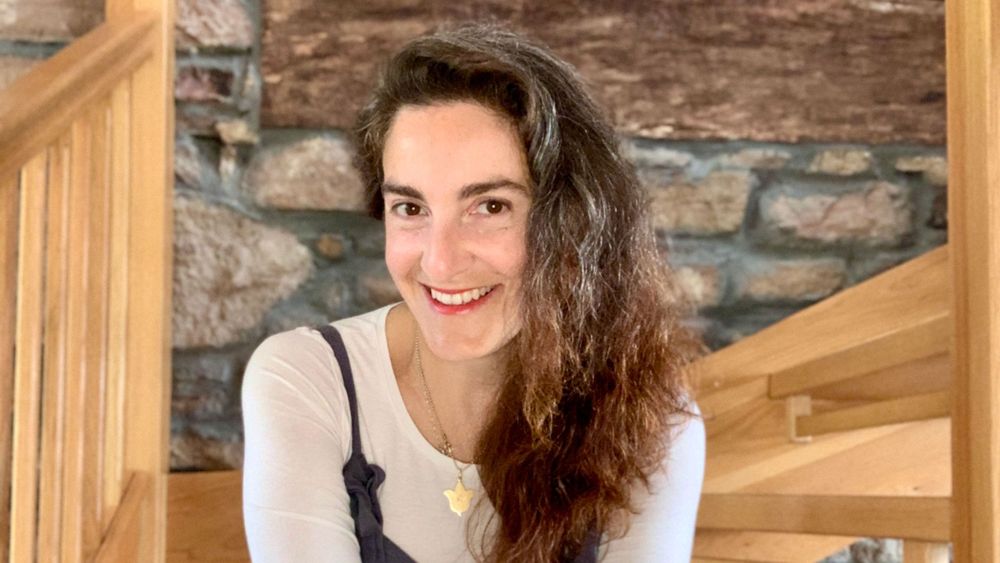Do you think like a vegan? Emilia Leese discusses how to
Emilia A. Leese, hosts a podcast, writes a blog as well as essays on life, travel and veganism for a variety of online publications and is closely involved in a long-term forest rewilding project in the Scottish Highlands: she was kind enough to sit down and answer some of our questions around her wonderful book Think Like a Vegan: What everyone can learn from vegan ethics?
V-Land UK (V-L): How would you describe your book, Think Like a Vegan: What everyone can learn from vegan ethics?
Emilia A. Leese (EL): Think Like a Vegan is an approachable and accessible vegan ethics guidebook. It’s for anyone interested in veganism, the values behind it, and what we can all learn from its practice. It explores how vegan ethics can be applied to every area of our daily lives. In it, we examine a variety of contemporary topics related to animal use: from the basics of vegan logic to politics, economics, love and other aspects of being human. We’ve also included a chapter on practical, real-life scenarios to help readers work through what might be tricky situations and at the end of each chapter, we provide a short summary of the key takeaways.
V-L: How did you meet Eva?
EL: Eva and I met in 2016 at a vegan conference on the campus of University of California at Berkeley. Our chance meeting was thanks to vegan pastries. Also, we were both interested in listening to the same speakers. Unbeknownst to one another, we had been for a run in the same canyon that morning and were in the same vegan deli for breakfast, and we had the same list of must-try vegan food spots. During one of our first breaks, off we went to Donut Time. And what sealed the deal was bringing back a box of doughnuts to a macrobiotic cooking presentation.
V-L: Why did you write Think Like a Vegan?
EL: Despite living on two different continents, we met up every year at a large vegan outdoor festival that took place in various cities in the US and Canada and which Eva helped produce. I volunteered to be in the festival’s “Why should I go vegan? Ask here!” tent, where I’d answer people’s questions about veganism. Over time, I’ve spoken with thousands of people. In the summer of 2018, after the Toronto festival, we were once again inspired over vegan pastries.
We were chatting about our experiences in talking with people about veganism, whether at the festival or just in general. We found people were asking us about veganism and even other vegans would defer to us when asked questions because they didn’t feel confident answering.
We don’t feel we have any special powers or knowledge that anyone else couldn’t also share. And we believe everyone is an advocate in their own way. So, we set about thinking what we could do to empower others to think and talk about veganism confidently.
Initially, we thought writing the book as a sort of workbook would be sufficient – and that’s what we’ve done with the last chapter of the book with the real-life scenarios it presents. Then, we considered that idea needed more substance to support it. After all, you can’t have a workbook without a proper foundation. And we wanted that foundation to be conversational rather than a lecture on vegan ethics. We wanted people to learn and think about veganism organically, as if they were having a conversation with us about different topics. And that’s how we settled on the format and content for the book.
V-L: What was the most challenging aspect of writing the book?
EL: Two things. The first is time! Researching, thinking, writing, editing and rewriting are all very time-consuming. And that’s writing the book. Then there’s all the activities related to promoting the book and getting our work out there. That’s also been very time consuming and just as essential as writing the book. I’ve learned so much about video editing, promotion, social media and different styles of communicating that I’d no idea I’d be learning after writing a book.
The second thing is understanding the full scale and magnitude of animal agriculture both in terms of the sheer numbers of animals used each year and of economics. It’s one thing to be vaguely aware of it and quite another to have the facts and figures.
And it’s all been worth it.
V-L: What do you want readers to get out of reading Think Like a Vegan?
EL: There’s so much interest in plant-based foods and so many new products. And that’s a great thing! We don’t want the philosophy to get lost though.
We want to help someone non-vegan to understand their vegan friend, colleague or family member. We want vegans to think about veganism more fully and be more confident in being advocates in whatever way they choose, even if that activism is living their vegan lives day by day. And if we can do both these things, it means we’ll be encouraging and facilitating positive and productive conversations within and across social communities.
Fundamentally, we want people to think about veganism as the simple concept that using animals is unjustified and unnecessary. Including animals, who are sentient like us, in our moral sphere is basic fairness. And we owe them that.

Emilia Leese
V-L: Many people have taken an interest in veganism because of environmental concerns. Do you talk about that in your book?
EL: We have a chapter dedicated to the environmental impact of animal agriculture. We’ve made sure to cite studies and scientific sources so people can read in more depth if they’re interested. And even within this chapter on environmental concerns, we bring our focus back to ethics because ultimately our moral obligations to those communities on the front lines of climate breakdown clearly intersect with our moral obligations to animals.
V-L: And what about health concerns – do you offer readers some insights into that aspect?
EL: Our “Healthy and Frugal Vegan” chapter tackles some of the myths associated with eating a vegan diet. We provide a handy reference to what well-respected medical and dietary institutions say about veganism.
We talk about how veganism isn’t either a marker for good or ill health. It can help, sure. But we wanted to ensure the conversation went deeper than that and away from the oppressive, and often ableist, ideas that eating this or that will make one healthy or unhealthy. Health is a complex matter deserving fulsome discussion and not magic foods.
And the other big topic we address is food costs and accessibility. Veganism isn’t all about products or about replacing one type of meat for another, plant-based one. So, we talk a bit about cost considerations, comparing a variety of food items, covering subsidies and scale and generally expanding on the usual beans are cheap and vegan cheese is expensive narrative.
V-L: You’ve set veganism squarely within social justice. Can you explain that?
EL: Although our primary focus is the injustice of animal use, we recognise that society’s systemic injustices are related and interconnected. Seeking a fair world for animals means we must also seek to reject and redress the injustices perpetrated on people. These aren’t mutually exclusive goals, or mutually exclusive ideas. Seeing the vulnerability of one will open our minds, eyes and heart to the other. All human injustices may be opposed, fought, addressed, dismantled, read, written, learned and talked about, whilst sticking to eating plants and being vegan.
V-L: During author talks and events, what’s the single most surprising thing for your audience?
EL: Many non-vegans attend our book events. Without a doubt it’s the fact almost 83% of global agricultural land is used for animal farming, whether that’s growing the crops to feed animals or grazing or housing them, and animal products only providing 18% of global calories. The next most surprising thing is when they learn 75% of global soya production goes to animal feed, including farm-raised fish.
V-L: What’s your elevator pitch for veganism?
EL: Like us, animals aren’t things. They feel, think, dream, play, have friends and families. They do these things differently than us, sure. They have different intelligence and skills than we do. And they look different from us. And so what? We all look different or live differently, and have different intelligence and skills. None of these are good enough reasons to exploit and kill anyone. All of us, human or animal, want to live. We all don’t want to be exploited and used as objects. And that’s why we should be vegan.
